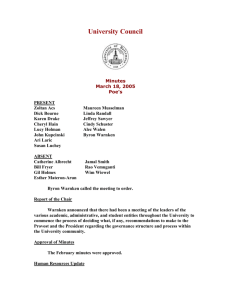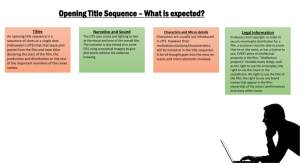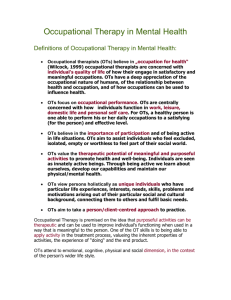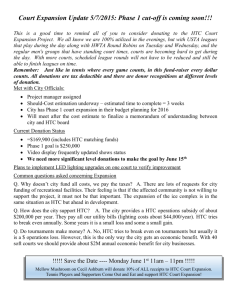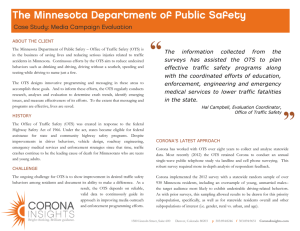READ ONLY THIS SIDE OF THE SHEET BEFORE THE EXAM... SPRING '00 - 15.615 -- THE MANAGER'S LEGAL FUNCTION
advertisement
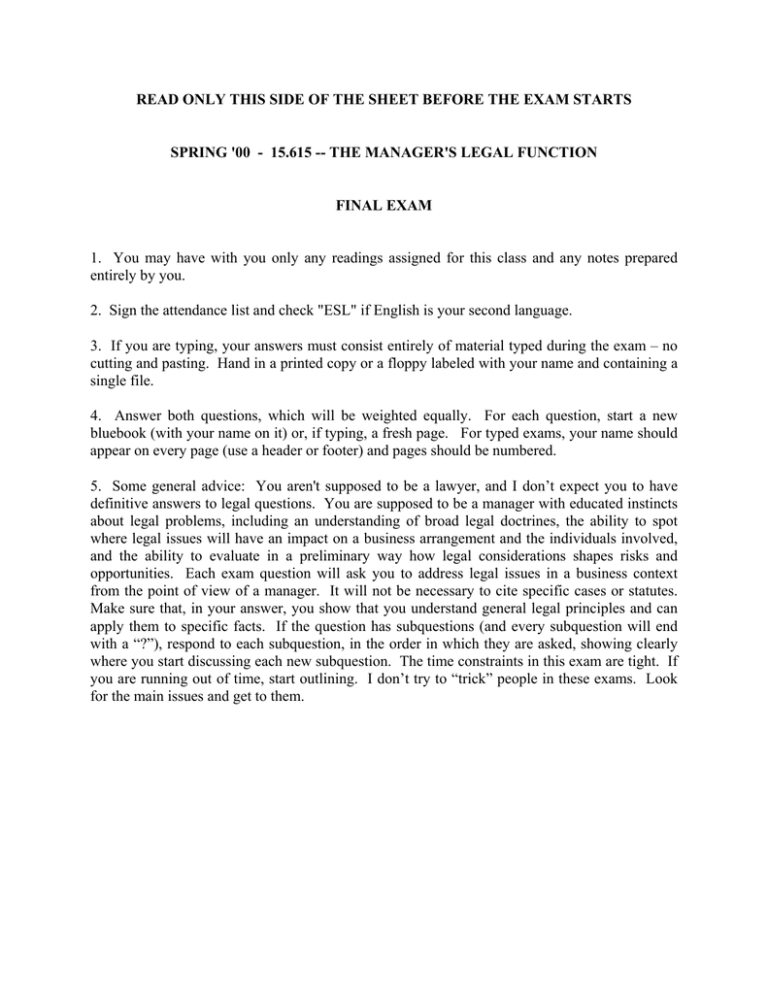
READ ONLY THIS SIDE OF THE SHEET BEFORE THE EXAM STARTS SPRING '00 - 15.615 -- THE MANAGER'S LEGAL FUNCTION FINAL EXAM 1. You may have with you only any readings assigned for this class and any notes prepared entirely by you. 2. Sign the attendance list and check "ESL" if English is your second language. 3. If you are typing, your answers must consist entirely of material typed during the exam – no cutting and pasting. Hand in a printed copy or a floppy labeled with your name and containing a single file. 4. Answer both questions, which will be weighted equally. For each question, start a new bluebook (with your name on it) or, if typing, a fresh page. For typed exams, your name should appear on every page (use a header or footer) and pages should be numbered. 5. Some general advice: You aren't supposed to be a lawyer, and I don’t expect you to have definitive answers to legal questions. You are supposed to be a manager with educated instincts about legal problems, including an understanding of broad legal doctrines, the ability to spot where legal issues will have an impact on a business arrangement and the individuals involved, and the ability to evaluate in a preliminary way how legal considerations shapes risks and opportunities. Each exam question will ask you to address legal issues in a business context from the point of view of a manager. It will not be necessary to cite specific cases or statutes. Make sure that, in your answer, you show that you understand general legal principles and can apply them to specific facts. If the question has subquestions (and every subquestion will end with a “?”), respond to each subquestion, in the order in which they are asked, showing clearly where you start discussing each new subquestion. The time constraints in this exam are tight. If you are running out of time, start outlining. I don’t try to “trick” people in these exams. Look for the main issues and get to them. FACTUAL BACKGROUND TO BOTH QUESTIONS You are O.P. Hotshot, the CEO of Healthtech Co. (“HTC”). HTC is a publicly held company with $200 million in sales and a very solid balance sheet. It is a regional market leader (with a 40% market share) in a four-state region in the provision of kidney dialysis services (a long-term life-saving treatment for persons with failing kidneys). Patients receiving dialysis travel several times a week to one of Healthtech’s chain of clinics, or receive the treatments on Healthtech equipment installed in their homes, with the assistance of a visiting nurse from Healthtech who visits the home several times a week. A competing dialysis company, On The Skids, Inc (“OTS”) is in cash-flow trouble after an ambitious expansion program. OTS is about half the size of HTC. OTS is closely held, with top managers and a few outsiders owning all the stock. Humble Pie, the OTS CEO, is also the largest shareholder. QUESTION #1: You are about to sit down with Humble to talk about a deal. You know from two quick phone calls with Humble that he will put the following options on the table: - HTC could extend a credit line to OTC, with the loan very generously secured by a mortgage on all of OTC's dialysis clinics. - HTC could make a cash infusion into OTC by purchasing a minority interest in OTC. - OTC could sell a substantial portion of its assets to HTC. (i) From an antitrust point of view, what are the likely sensitive points to each of the three options? (ii) Even if one of the options is implemented, OTC will still be at risk of not being able to pay its creditors. What would be the bankruptcy-related risks to HTC under each of the options if OTC were to later go into bankruptcy? QUESTION #2: It is a year later. After long negotiations, HTC purchased all the shares in OTS and has merged OTS into HTC. (i) Business for the merged companies has been disappointing, especially at what had been OTS operations, and you have not been impressed with the managerial talent from OTS. Large layoffs are now planned, to be concentrated in the employees from OTS. There are no unions. - OTS was strongest in the biggest metropolitan area in your region, as a result of which most of the African American employees of the merged companies came from OTS. Will this complicate the layoffs? - Some female middle managers from OTS have met with your vice president to say that most women at OTS had viewed OTS as unreceptive to promoting women to top management, and expressed the hope that HTC would be more enlightened. What legal issues does this raise for the planned layoffs? (ii) Some dialysis equipment can be reused until it degrades below technical standards set by the government. The use of excessively degraded equipment is a possibly lethal health threat, and probably a criminal violation of several federal regulations. You have just learned that during its last months, OTS was more aggressive than you would ever be in reusing equipment. You suspect that some equipment testing was “stretched” if not fraudulent. You are confident that current testing is proper, but you can't be sure any improper practices stopped the moment HTC acquired its controlling interest. You are about to meet with the Executive Committee of your Board of Directors. - You expect that some Committee members will ask about their personal legal exposure. How do you address that concern? - You are worried about your own personal legal exposure. How do you address that concern?
